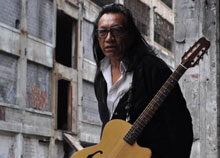
Top stories



ESG & Sustainability#BudgetSpeech2026: SRD grant unchanged, other Sassa social grants see hike
6 hours



More news











ESG & Sustainability
South Africa’s carbon tax should stay: climate scientists explain why











Big Concerts laid on another good performance and the event was well organised despite the opening concert starting somewhat late. But nothing was going to detract the fans to see if Sugar Man had indeed been found.
This tour series follows on the success of Searching for Sugar Man, a Swedish-made film nominated for an Academy Award for Best Documentary. The doccie follows the story of local music journalists and a record store owner discovering that Rodriquez was very much alive and living in Detroit. Popular local culture believed Rodriquez had committed suicide on stage many years before.
The Rodriquez phenomenon has its roots in apartheid South Africa. The hit Cold Facts with a clear anti-establishment war cry became synonymous with the underground anti-apartheid movement. Many of his songs were either banned or censored. The doccie contains important footage of how vinyl records were tampered with by the old nationalist security services.
At one stage during his career Rodriquez was mooted as the next Bob Dylan. Although his two albums were a resounding flop in the US, he achieved one Platinum in South Africa and five in Australia. Part of the Rodriquez tragedy is that he never received royalties for his record sales.
Rodriquez kicked off the first of his South African tour series on Saturday, 9 February at Grand West. Packed to the rafters, the devout followers soon filled the aisles as they grooved and jived to that familiar voice. For me, the songs and music recalled vividly 1970s' garage parties and debauched house parties in suburban Salisbury during the Rhodesian Bush War.
Security staff had a hard time keeping diehard fans away from the stage. Tracks from his Cold Fact album featured prominently and many a fan sang along with gusto as Rodriquez at times struggled to keep up with his excellent back-up band and the phenomenal energy and support from his audience. Just for fun, a few cover songs were thrown in such as Blue Suede Shoes, which really got the show going.
Dressed in his signature black-and-charcoal suit, black hat and Yoko Ono-ish glasses he cut an impressive, if somewhat lonely, figure. Long black hair framed a handsome face with a sparkling white smile to boot. The audience responded favourably when Rodriquez removed his jacket to reveal a pair of impressively strong arms - clearly as a result of his days spent as a construction worker.
On Saturday evening it was clear that Rodriquez had reached the hearts of generations across four decades. The lyrics of most of his songs are probably still appropriate for the challenging times the world and society are currently facing.
For many years Rodriquez worked on construction sites during the day and at night played the dodgy bar circuit of Detroit. He was taking care of his three daughters. Some of his colleagues viewed him as a drifter. He did, however, have political interests and at one stage unsuccessfully tried to run for Mayor of Detroit.
Rodriquez is a man of few words and articulates himself better when singing. On a few occasions he tried to interact with the audience, responding rather shyly to cat calls and whistling. But his real skill is revealed with a guitar in his hands. He is a master at his craft and his sharp sense of humour and great humility shines through.